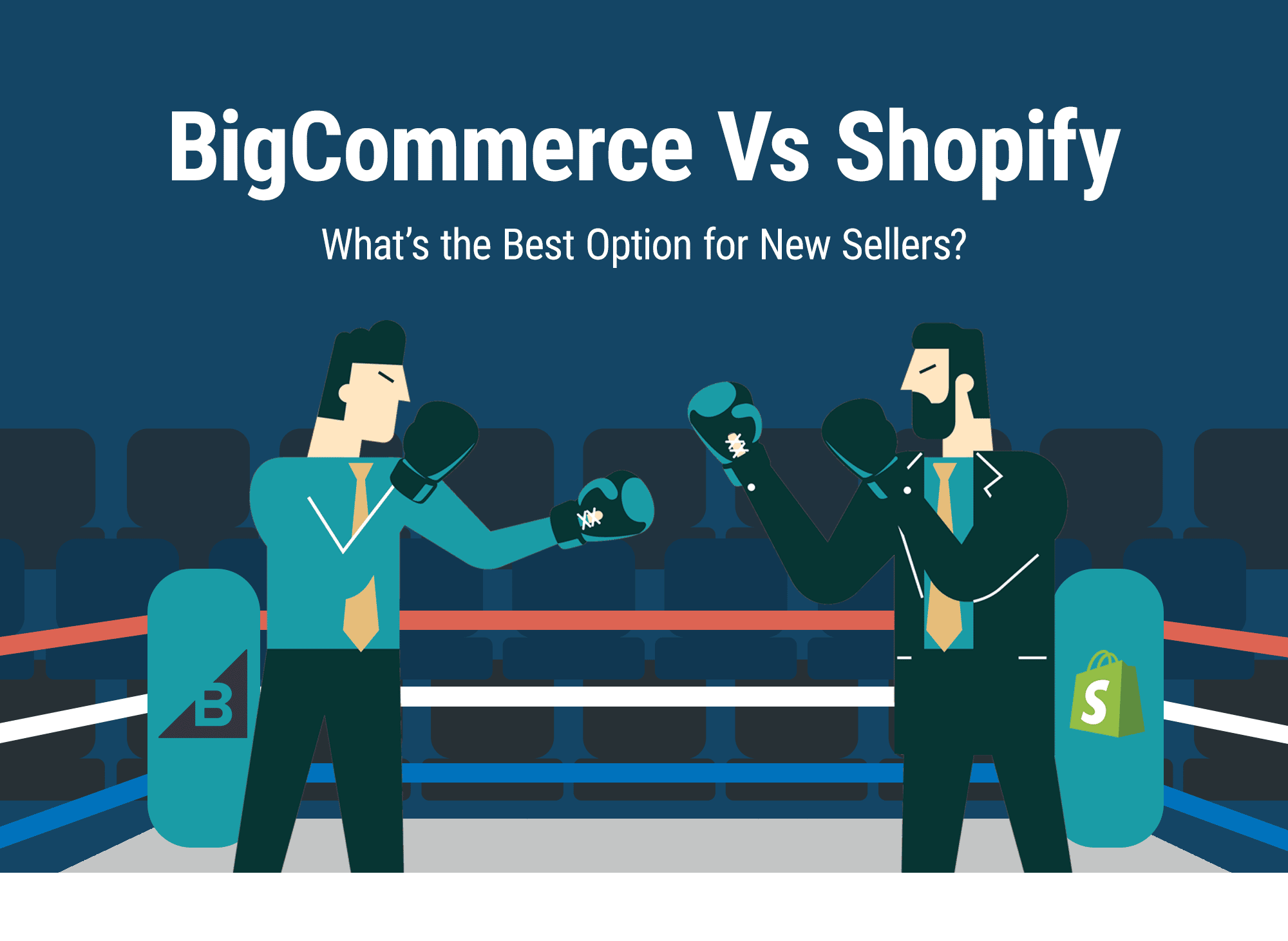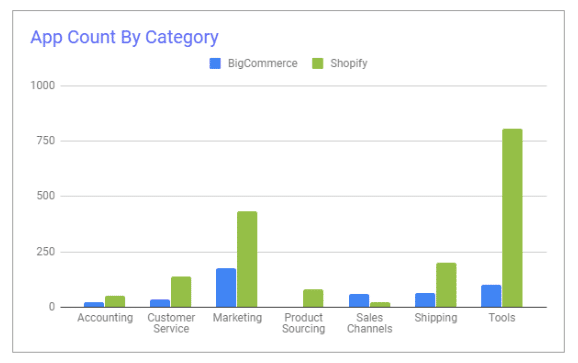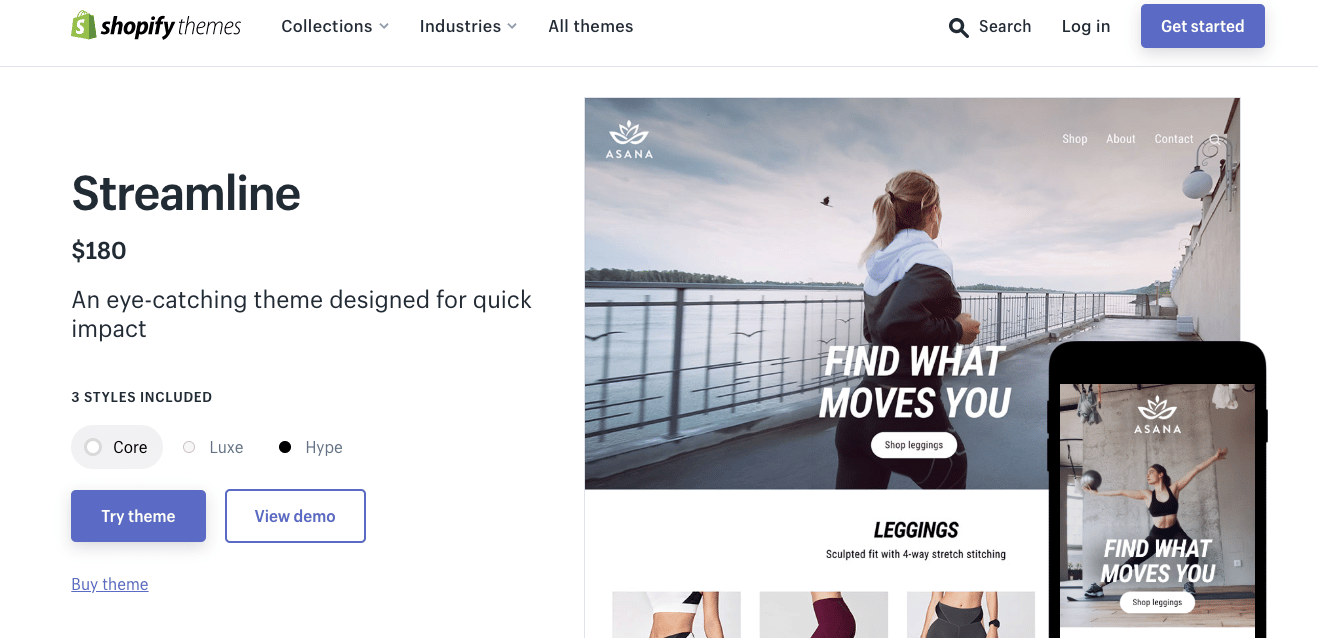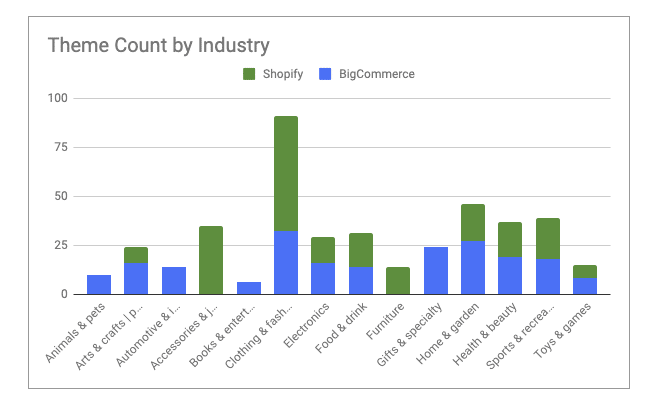BigCommerce vs. Shopify: What’s the Best Option for New Sellers?

Selling on established marketplaces like Amazon allows your brand to reach a greater audience. However, you’d still want to have an online store where potential customers can have full and easy access to all your products.
That said, there are a handful of ecommerce platforms out there that allow would-be entrepreneurs to create their own website. However, BigCommerce and Shopify are the two that have always been popular among online sellers. They are also the easiest to set up and use, something any new seller would be thankful for.
You’ve just started selling your products and want to hop onto an ecommerce platform. Which one should you go for?
This article will take a deep dive at comparing BigCommerce vs. Shopify, from its features, pros and cons, and more. But first…some quick background info.
Related Podcast: Episode 43, Bigcommerce vs Shopify
What Is BigCommerce?
BigCommerce was founded by Australians Eddie Machaalani and Mitchell Harper in 2009. It initially branded itself as a hosted shopping cart but has since transitioned to “a highly-extensible SaaS solution”. Today, the company is headquartered in Austin, Texas, employs about 500 people, and boasts $17 billion in merchant sales.
BigCommerce has been targeting established businesses who wish to solidify their presence online. It’s launched an Enterprise option for the big brands and is teaming up with companies that can help boost recurring business for its customers.
What Is Shopify?
Shopify was early to the party. In 2004, Tobias Lütke, Daniel Weinand, and Scott Lake were launching an online store that sold snowboarding equipment. Dissatisfied with the ecommerce tools available in the market, the trio decided to create their own. Two years later, they came up with Shopify.
In 2023, there are more than 4 million active stores in Shopify. Statistics show that 87% of merchants use the Shopify App Store, installing 6 apps on average. Its App Store has generated over $100 million in revenue.
The company has been expanding its product offerings and is diversifying into other areas of ecommerce. More recently, it expanded beyond its roots as an ecommerce platform by coming up with its own fulfillment network.
Pricing
BigCommerce and Shopify have almost identical features for its basic plans. Shopify Basic and BigCommerce Standard are both available for $29.00.
Below is a table that shows what new sellers can get for each platform’s 29-dollar basic plan.
| bigcommerce standard | shopify basic | |
|---|---|---|
| Website |
Yes |
Yes |
| Sales channels |
Yes |
Yes |
| Staff accounts |
Yes |
Yes |
| 24/7 support |
Yes |
Yes |
| Unlimited bandwidth |
Yes |
Yes |
| 24/7 chat support |
Yes |
Yes |
| Coupons, gift cards, and discount codes |
Yes |
Yes |
| Abandoned cart recovery |
|
Yes |
| Custom SSL |
|
Yes |
It’s worth pointing out though that the new sellers can start cheaper with Shopify Lite. At $9 a month, you get a “buy button” for every product you create on your Shopify panel. This can then be added on any website or on social media.
We've also included a table below of all the pricing plans Shopify and BigCommerce offers to their customers.
Shopify pricing
| basic | shopify | advance |
|---|---|---|
| $25/month |
$65/month |
$399/month |
| Basic reports |
Professional reports |
Custom report builder |
| Up to 1,000 inventory locations |
Up to 1,000 inventory locations |
Up to 1,000 inventory locations |
| 2 staff accounts |
5 staff accounts |
15 staff accounts |
| Basic performance reports |
Standard performance reports |
Advanced performance reports |
| Fraud analysis |
Fraud analysis |
Fraud analysis |
| Abandoned cart recovery |
Abandoned cart recovery |
Abandoned cart recovery |
|
|
Third party calculated shipping rates |
BigCommerce pricing
| standard | plus | pro |
|---|---|---|
| $29/month |
$79/month |
$299/month |
| 0% transaction fees |
0% transaction fees |
0% transaction fees |
| Unlimited products, file storage and bandwidth |
Unlimited products, file storage and bandwidth |
Unlimited products, file storage and bandwidth |
| Manage up to 3 storefronts |
Manage up to 5 storefronts |
Manage up to 8 storefronts |
| 24/7 tech support |
24/7 tech support |
24/7 tech support |
| Integrate with Amazon, eBay, Walmart, Facebook, Instagram |
Integrate with Amazon, eBay, Walmart, Facebook, Instagram |
Integrate with Amazon, eBay, Walmart, Facebook, Instagram |
| Single page checkout |
Single page checkout |
Single page checkout |
|
Persistent cart |
Persistent cart |
|
| Customer groups and segmentation |
Customer groups and segmentation |
|
|
Abandoned cart saver |
Abandoned cart saver |
|
|
|
Google customer reviews |
|
|
|
Custom product filtering |
Features
Most EcomCrew fans would know that we’re partial to Shopify. But, it’s worth mentioning that the merits of both have been equally recognized on both the blog and podcast.
In episode 43, Mike and Grant Chen, people who helped run EcomCrew, drilled down into what each platform has to offer and what their respective strengths were.
Grant also wrote an extensive blog post on this. When comparing both platforms, he had this to say.
“Before I signed up with BigCommerce, I played with both systems to really try to gain an understanding of how each worked. The simplest explanation I can give is that Shopify is like a Mac and BigCommerce is like a PC. Shopify is initially aimed at non-tech savvy users and tries to minimize the amount of buttons, widgets and gadgets available. BigCommerce, on the other hand, has a plethora of tools, customization options, settings and out of the box functionality.”
That comparison does hit the mark. BigCommerce allows extensive customization because its apps and themes come with bells and whistles that more advanced users will appreciate. Meanwhile, Shopify makes the convenience of the user a priority.
In the previous section, I talked about how pricing for a basic plan was identical on both BigCommerce and Shopify. Now, let’s get to the specific features.
Surprise…surprise. They too offer just about the same of everything a new seller might expect from an ecommerce platform.
| Features | Shopify | BigCommerce |
|---|---|---|
| Free trial |
3 days |
15 days |
| Unlimited products in your store |
Yes |
Yes |
| Unlimited orders |
Yes |
Yes |
| Unlimited disk space |
Yes |
Yes |
| Unlimited bandwidth |
Yes |
Yes |
| 24/7 chat support |
Yes |
Yes |
| A fully-featured online store website + shopping cart |
Yes |
Yes |
| Optimized store for mobile |
Yes |
Yes |
|
Multiple online gateway systems |
Yes |
Yes |
| Automate tax calculation |
Yes |
Yes |
| Free SSL integration |
Yes |
Yes |
| Inventory management |
Yes |
Yes |
| Store reports |
Yes |
Yes |
Apps
Both platforms boast having hundreds of apps for merchants to use as they see fit. However, statistics indicate that Shopify offers more variety. To date, it has more than 10,000 apps while BigCommerce only has 651 on its app store.
Here’s a side-by-side comparison of the app count on both platforms for categories that new sellers are likely to tap into.
| Number of apps | BigCommerce | shopify |
|---|---|---|
| Accounting |
24 |
53 |
| Customer service |
36 |
137 |
| Marketing |
174 |
433 |
| Product sourcing |
3 |
80 |
| Sales channels |
59 |
21 |
| Shipping |
63 |
199 |
| Tools |
100 |
807 |
As evidenced by the chart below, Shopify has more app options to offer new sellers on its platform.
Themes
Both BigCommerce and Shopify also have a wide selection of professional-looking themes that can be adopted by new sellers to fit the desired brand aesthetic.
With no reliable numbers available on just how many themes they are on each of these platforms, we’ve analyzed their respective Themes pages to determine volume.
At a glance, both platforms appear to have hundreds of themes; plenty of options for the new ecommerce entrepreneur to choose from. However, it's worth noting that these themes come with a number of variations or styles. Both platforms are similar in that they have somewhere between 2-4 styles per theme.
Refer to the samples below.


With that, here are the stats for unique themes on each platform.
| free | paid | |
|---|---|---|
| BigCommerce |
5 |
34 |
| Shopify |
8 |
64 |
Shopify is the clear winner here with twice as many themes as BigCommerce. It has a total of 72 unique themes while BigCommerce has 39. Refer to the table below for distribution between free and paid themes.
When it comes to industries, BigCommerce offers a bit more variety than Shopify, with themes that can be used for niches like Animals & Pets and Books & Entertainment.
See the table below for the theme count that can be used for a given industry or niche.
| BigCommerce | shopify | |
|---|---|---|
| Animals & pets |
10 |
0 |
| Arts & crafts I photography |
16 |
8 |
| Automotive & industrial |
14 |
0 |
| Accessories & jewelry |
0 |
35 |
| Book & entertainment |
6 |
0 |
| Clothing & fashion |
32 |
59 |
| Electronics |
16 |
13 |
| Food & drink |
14 |
17 |
|
Furniture |
0 |
14 |
| Gifts & specialty |
24 |
0 |
| Home & garden |
27 |
19 |
| Health & beauty |
19 |
18 |
| Sports & recreation |
18 |
21 |
| Toys & games |
8 |
7 |
The chart below illustrates how distributed the themes are across industries. However, it’s worth mentioning that many of the themes on both BigCommerce and Shopify are classified under more than one industry.
Design
Both BigCommerce and Shopify appear to have an easy-to-navigate user interface. As you can see in the screenshots below, the homepage on their respective websites have a similar layout. The logo and header are to the left while images are on the right. A ‘free trial’ button is also featured prominently on both websites.

Pros and Cons for BigCommerce and Shopify
You can't go wrong with either Bigcommerce or Shopify as a platform to run your online store. However, they aren't the only options out there. Here is a list of each platform's pros and cons to help you decide which platform best suits your business.
Pros and cons of BigCommerce
Pros
- Interface is easy to understand
- Flexible pricing plans
- Generate comprehensive reports
- Effortless coupon creation
Cons
- High price point
- Limited free themes
- Limit on annual online sales
- Add-ons are limited
Pros and cons of Shopify
Pros
- Designed specifically for e-commerce
- User-friendly interface
- Extensive app store with hundreds of options to choose from
- E-commerce sellers can find a robust set of e-commerce features
Cons
- Can be too expensive for smaller businesses
- The steep learning curve for beginners in e-commerce
- Limited flexibility for website design
- Adding apps and features can easily increase the monthly or annual fees
Alternatives to BigCommerce and Shopify
Even though BigCommerce and Shopify are two of the bigger names in building an online store, it doesn't mean you should only limit your options between the two.
If you've been selling on either platform for years or still in the process of choosing a software for your business, don't be afraid to to chain yourself to one platform. This way you can find the most optimal platform that suits your business' needs.
-
- Squarespace
- Volusion
- GoDaddy
- Shift4Shop
- Wix
- Weebly
Frequently Asked Questions
Which is more beginner friendly, Bigcommerce or Shopify?
Shopify takes the cake on this one. BigCommerce uses complex terms in their system and their interface can get confusing, especially if its your first time using a store builder.
Users only get to reap the benefits of BigCommerce once they've invested time to learn and study the tools of the platform.
Which has better designs, BigCommerce or Shopify?
Both platforms offer free themes. However, Shopify’s themes are less uniform and easier to use. Which is great for beginners.
Can you migrate your store From BigCommerce to Shopify and vice-versa?
Yes. Both Shopify and BigCommerce offer data migration apps on its platform to make it easy for sellers to switch platforms without losing any relevant data.
Is Shopify Better Than Bigcommerce?
If you know how to code or run a business with hundreds of SKUs that could also have hundreds of variations each, then BigCommerce could be your best bet. On the other hand, if you sell products that are fairly straightforward with relatively few SKUs, then Shopify is the way to go.



